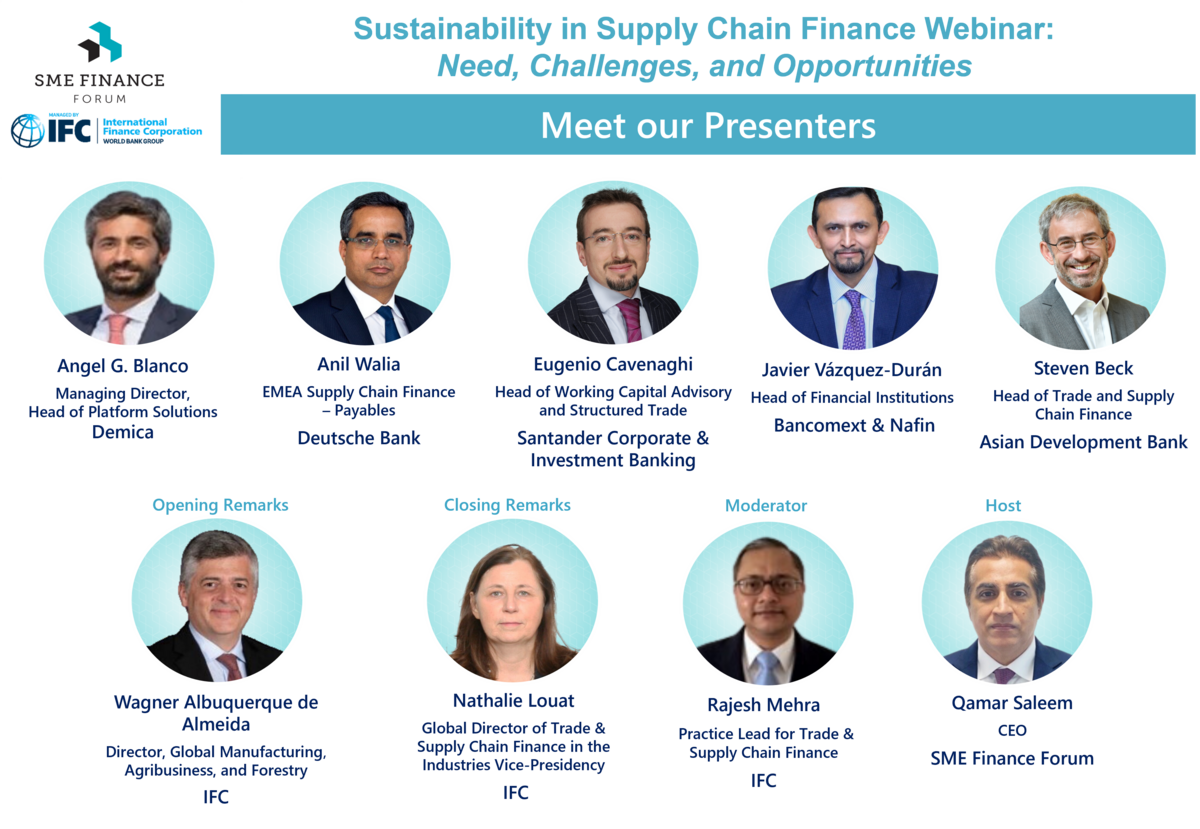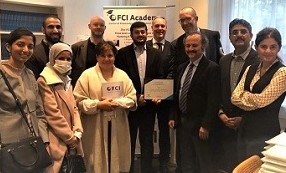Blog
Greening SME Finance through a Sustainable Supply Chain

This blog is the summary of our third Member Spotlight with RootAnt.
The concept of sustainability and the recognition of SMEs’ roles in the sustainable supply chain have gradually become more significant these years. Embedding sustainability factors into supply chain finance provides incentives to SME suppliers down the value chain, further unlocking hidden markets and creating new revenue streams for banks.
As part of the 2021 Member Spotlight Series, SME Finance Forum hosted its third Member Spotlight with Lincoln Yin from RootAnt, Rajeev Kannan from SMBC, Puneet Chaddha from HSBC, and Lechi Zhang from the SME Finance Forum. In this session, speakers shared their thoughts on the importance and potential of sustainable supply chain finance for APAC in the coming years, how collaboration plays a major role in the success, and how SMEs can benefit greatly from the mainstream adoption of supply chain finance.
The initial topic discussed was sustainability-linked finance approaches, including sustainable bonds, green bonds, green loans, and green sustainable supply chain finance. Puneet Chaddha, the former Regional CEO for HSBC Group’s asset management business in South East Asia, introduced three different categories of sustainable finance. Companies specifically raise green bonds for ring-fenced projects that are complying with sustainability requirements. As opposed to green bonds, green loans are extended to companies that are developing a sustainability-focused product, such as a biodegradable consumer product. Thus, compared to green bonds, the end-use of green loans is more flexible but still focuses on specific areas. Sustainable finance is the broadest category because it includes loans given to the companies that have agreed or are agreeing to enhance their sustainability by looking at the sustainability footprint, measuring it, and setting targets to improve it. Therefore, the end-use for sustainable finance is not specified, as long as the company is on its path to becoming more sustainable.
Sumitomo Mitsui Banking Corporation (SMBC) is one of Japan’s leading banks and Sumitomo Mitsui Financial Group’s core unit. The Managing Executive Officer and Deputy Head of Asia Pacific Division of SMBC, Rajeev Kannan, first presented SMBC’s GREEN×GLOBE 2030 initiative. The primary targets of this plan are to provide 10 trillion Japanese Yen green finance, offer financial and economic education to 1.5 million people, establish a community to solve social issues, and reduce CO2 emissions by 30%. In 2020, globally over $200 billion of green / ESG loans came to market, 42% more than 2019. Specifically, in Asia, the green loans and ESG loans grew to over $35 billion in 2020. Rajeev Kannan further highlighted that even though Asia is still a small market compared to the rest of the world, it’s growing rapidly since most banks are creating more sustainable products.
Rajeev Kannan stated that for banks like SMBC, operating with smaller firms is a challenge and motivating them to go green and become sustainable is even harder. SME sector is an underbanked market but with a significant opportunity. To go wider and deeper into the SME market segments, creating platforms and working in partnerships are the critical solutions. Rajeev Kannan took the past experiences of SMBC as examples. In Indonesia, where SMBC acquired BTPN, they worked with IFC to put together a $150-million financing package to provide capital for local SMEs and support their growth. The company also cooperated with certain regional provinces where regencies offer access to certain SMEs, enabling SMBC to perceive the exact needs of local SMEs. Besides, in India, by providing a structure using C2FO, SMBC uses anchor clients like Panasonic as bases to go down one to three layers to SMEs. RootAnt is another partner of SMBC, enabling SMBC to widen the markets they can serve, with the supply chain as the key focus.
RootAnt, a digital transaction banking fintech, creates and connects enterprises and financial institutions for cheaper and greener financial services. The founder & CEO of RootAnt Group, Lincoln Yin, stated how they endeavored to combine supply chain with green and sustainable elements to benefit SMEs. Traditionally, SMEs have always found it hard to access formal financing due to lack of collateral, credit history or even cost considerations. Therefore, banks are more willing to take on risks and fund receivables from the larger and well-known anchor corporates. Accordingly, similar to Rajeev Kannan, Lincoln Yin also underscored the importance of penetrating the deeper tiers of suppliers. In mainland China, based on the law, the tier one suppliers obtain the right to claim the receivable, split the right, and transfer it to their tier two suppliers. This way, the large company’s credibility can be pass down to the deeper tier of the suppliers, unlocking value down the chain. Additionally, sustainability can be introduced to the anchor corporates’ value chain where increasingly customers or investors are asking for assurance that their supply chain is going green. The use of digital approaches to supply chain finance not just provide immediate liquidity to SMEs at scale, incentivizes the suppliers to be more sustainable, manage risks for financiers, it also enables reporting on emissions and other practices to come further down the chain.
Talking about standards and frameworks of the practical use of sustainable finance, Rajeev Kannan stated that as global institutions are using multiple relevant and practical parameters for SMEs, the critical issue for any green-related transactions is choosing suitable parameters and metrics to adopt. Likewise, Puneet Chaddha indicated that customization should exist as there is no unified framework that applies to all different segments. As for SMBC, it is using an independent evaluator for its green financing. In Singapore, the Monetary Authority of Singapore (MAS) and the International Accounting Standards Board (IASB) are also looking at a number of initiatives to provide incentive, training program, regional sustainability frameworks and create proper standards.
In terms of the integration of RootAnt’s deep-tier digital platform with related sustainability frameworks, Lincoln Yin highlighted that deep-tier supply chain finance could help both banks and large firms. Due to the traceability and transparency of all transactions, banks can go deeper, get visibility and finance specific transactions that is relevant to green and sustainability. Moreover, RootAnt extracts green finance related data from paper-based documents by using OCR and AI.
Finally, speakers shared their views on data and technology. Rajeev Kannan highlighted that SMBC sees the arrival of new FinTech as an opportunity to become nimble again and to seek more ways to collaborate with other platforms. For example, using BTPN’s digital platform, Jenius, SMBC expands its support for SMEs, such as offering financial management. Working in partnership with OakNorth would enable SMBC to utilize AI and machine learning to improve credit assessment and portfolio management, including potentially of SMEs. Besides, SMBC’s investee company, Northern Arc, provides more microfinance information to help SMBC penetrate the underbanked market in India. Regarding the data privacy regulation, Puneet Chaddha emphasized that the key issue is the robustness and the efficiency of the technology platform in processing the data. Many companies have multiple systems, but what they ideally need is a one-stop-shop to submit and extract the required data.









